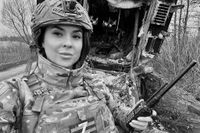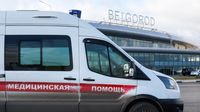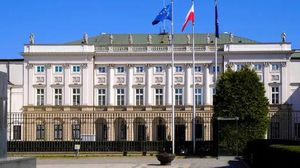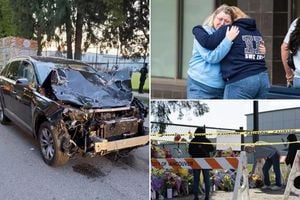In a tragic incident underscoring the dangers faced by journalists operating in conflict zones, Anna Prokofieva, a military correspondent for the First Channel, was killed while covering events in the Belgorod region, located on the border with Ukraine. According to a report from TASS, Prokofieva, who was 35 years old, died when her filming crew struck an enemy mine during their assignment. Accompanying her, operator Dmitry Volkov suffered injuries but is currently in stable condition.
Prokofieva’s death highlights the perilous nature of reporting from war zones, particularly as she had recently undertaken coverage of significant events in regions such as Sudzha. Working for the First Channel since 2023, she had earned a reputation for her brave and insightful reporting. Her contributions included not only front-line dispatches but also significant humanitarian efforts, as she was involved in evacuating civilians from conflict areas.
The loss is keenly felt within both the media community and the public, with the First Channel expressing its profound condolences to Prokofieva’s family and friends. The station's press service reiterated the dangers media professionals face, stating, "Anna Prokofieva died while fulfilling her professional duties, having dedicated her life to reporting from the front lines of conflict."
As reported, the tragic events leading to Prokofieva's death unfolded on March 26, 2025, when her crew encountered an enemy mine in Belgorod. Witness accounts suggest that there has been ongoing conflict in the region as Ukrainian forces recently entered the village of Demidovka, about two kilometers from the border with Ukraine, where skirmishes have been reported. The area remains volatile, emphasizing the growing risks for journalists attempting to document these critical moments.
The Investigative Committee of Russia has launched a criminal investigation into the incident, which is focusing on several charges, including murder and obstruction of journalists’ lawful professional activities. This marks yet another somber reminder of the multifaceted threat journalists face in conflict areas, where their very presence can provoke deadly incidents.
In addition to Prokofieva, another grim report indicates that Alexander Fedorchak, a correspondent from Izvestia, also died under similar circumstances, highlighting the continuous risks journalists face while performing their duties in areas of conflict. Both instances reflect a deeper narrative of the consequences surrounding military operations and the personal toll on those committed to informing the public about the realities of war.
Maria Zakharova, the representative of the Russian Ministry of Foreign Affairs, addressed the ongoing threat faced by journalists, pointing out that there is a 'targeted hunt' targeting Russian military correspondents in the conflict zones. The Council for Human Rights under the President of Russia has called upon the international journalism community to denounce such acts and support Russian military correspondents who face dangers daily.
This incident comes against a backdrop of intense conflict, with previous fatalities among journalists reported since the beginning of the special military operation in Ukraine. Russian President Vladimir Putin stated last June that over 30 journalists have lost their lives while covering the conflict. The investigation into Prokofieva's death is not only a personal tragedy but also a significant event that underscores the ongoing battle surrounding press freedoms in war-torn regions.
The loss of Anna Prokofieva serves as a sobering reminder of the sacrifices made by journalists worldwide, who risk their lives to bring critical stories to light amidst chaos. As the story unfolds, it raises urgent questions regarding the safety of media personnel in combat zones and the constantly shifting landscape of journalistic integrity and freedom.







